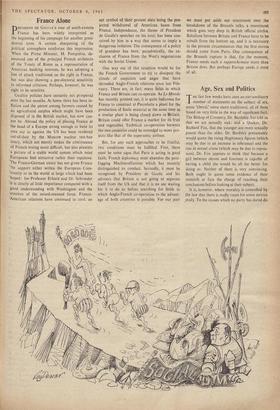France Alone
pRESIDENT DE GALII LE'S tour of south-eastern France has been widely interpreted as the beginning of his campaign for another presi- dential term. A certain sharpening of the political atmosphere reinforces this impression. When the Prime Minister, M. Pompidou, de- nounced one of the principal French architects of the Treaty of Rome as a representative of American banking interests, he was adopting a line of attack traditional on the right in France, but was also showing a pre-electoral sensitivity to informed criticism. Perhaps, however, he was right to be sensitive.
Gaullist policies have certainly not prospered over the last months. At home there has been in- flation and the unrest among farmers caused by an agricultural surplus which might have been disposed of in the British market, but now can- not be. Abroad the policy of placing France at the head of a Europe strong enough to have its own say as against the US has been rendered out-of-date by the Moscow nuclear test-ban treaty, which not merely makes the continuance , of French testing more difficult, but also presents a picture of a stable world system which most Europeans find attractive rather than repulsive. The Franco-German treaty has not given France the support either within the European Com- munity or in the world at large which had been hoped : for Professor Erhard and Dr. Schroeder It is clearly of little importance compared with a good understanding with Washington and the creation of the mixed-manned force. Franco- American relations have continued to cool, an apt symbol of their present state being the pro- jected withdrawal qf American bases from France. Independence: the theme of President de Gaulle's speeches on his tour, has been con- ceived by him in a way that seems to imply a dangerous isolation. The consequence of a policy of grandeur has been, paradoxically, the ex- clusion of France from the West's negotiations with the Soviet Union.
One way out of this situation would be for the French Government to try to dissipate the clouds of suspicion and anger that have shrouded Anglo-French relations since last Feb- ruary. There are, in fact, many fields in which France and Britain can co-operate. As Le Monde has recently pointed out, it is quite ludicrous for France to construct at- Pierrelatte a plant for the production of fissile material at the same time as a similar plant is being closed down in Britain. Britain could offer France a market for its fruit and vegetables. Technical co-operation between the two countries could be extended to more pro- jects like that of the supersonic airliner.
But, for any such approaches to be fruitful, two conditions must be fulfilled. First, 'there must be some signs that Paris is acting in good faith; French diplomacy must abandon the petti- fogging Machiavellianism which has recently' distinguished its conduct. Secondly, it must be recognised by President de Gaulle and his advisers that Britain is not going to separate itself from the US and that it is no use waiting for it to do so before searching for fields in which Anglo-French co-operation to the advant- age of both countries is possible. For our part we must put aside our resentment over the breakdown of the Brussels talks, a resentment which goes very deep in British official circles. Relafions between Britain and France have to be rebuilt from the bottom up, and it is necessary in the present circumstances that the first moves should come from Paris. One consequence of the Brussels rupture is that, for the moment, France needs such a rapprochement more than Britain does. But perhaps Europe needs it most of all.










































 Previous page
Previous page